The Human Strain
by Matthew Becklo
Filed under Culture, The Problem of Evil
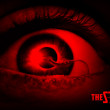
In his dark 1977 novel Lancelot, novelist Walker Percy brings us into the walls of a mental institution to hear a man named Lancelot tell his life story, a tale of empty commercialism, salacious self-destruction, and one murderous act of vengeance. Now confined by the four walls of an asylum, he confides in his old friend, a priest and psychiatrist, about the “quest” that led him there and the truth of the world outside: “In times like these when everyone is wonderful, what is needed... Read More
Pascal in “The Rum Diary”
by Matthew Becklo
Filed under Anthropology, Movies/TV

The Rum Diary is a rollicking farce based on Hunter S. Thompson's novel of the same name written in the early 1960s. It focuses on a young American journalist named Paul Kemp who ventures into sweaty, inebriated San Juan, Puerto Rico to write for an ill-fated newspaper, and stumbles into the middle of a major land acquisition deal.Thompson said that his "long lost" novel (which wasn't published until 1998) had "a romantic notion," and that it was simply "a good story." I haven't... Read More
The Argument from Johnny Cash
by Matthew Becklo
Filed under Music
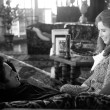
Recently, for my Mom’s 60th birthday, I put together a tribute video complete with creased photographs, old music, and clips of my brothers recounting a favorite memory of her—mostly revolving around her cooking or buying the four of us food. As part of the tribute, I asked my Dad to summarize their forty years of marriage together in a minute-long clip—a Herculean task that he met with such calmness and profundity that I knew instantly it would be the grand finale. I also... Read More
What is an Ad Hominem Fallacy?
by Dr. Edward Feser
Filed under Culture
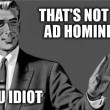
NOTE: Dr. Feser's contributions at Strange Notions were originally posted on his own blog, and therefore lose some of their context when reprinted here. Dr. Feser explains why that matters. As students of logic know, not every appeal to authority is a fallacious appeal to authority. A fallacy is committed only when the purported authority appealed to either does not in fact possess expertise on the subject at hand, or can reasonably be supposed to be less than objective. ... Read More
Why It’s Okay to be Against Heresy and for Imposing One’s Will on Others
by Bishop Robert Barron
Filed under Culture

Recently, two prominent Catholic women—Kathleen Sebelius in an address to the graduates of Georgetown University’s public policy school, and Maureen Dowd in a column published in the New York Times—delivered strong statements about the Church’s role in civil society. Dowd’s column was more or less a screed, while Sebelius’s address was relatively measured in tone. Yet both were marked by some pretty fundamental misunderstandings, which have, sadly, become widespread.... Read More
How Jesus Became God: A Critical Review
by Trent Horn
Filed under Book Reviews, Jesus
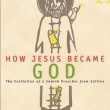
NOTE: Last week we featured a brief reflection by Fr. Robert Barron on biblical skeptic Bart Ehrman's new book, How Jesus Became God: The Exaltation of a Jewish Preacher from Galilee (HarperOne, 2014). Today we feature a more in-depth review by Trent Horn. Most Christians say the apostles came to believe Jesus was God after seeing how Christ’s resurrection vindicated his claims to divinity. But Bart Ehrman’s newest book, How Jesus Became God: The Exaltation of a Jewish Preacher... Read More
A Manual for Creating Atheists: A Critical Review
by Trent Horn
Filed under Atheism, Book Reviews
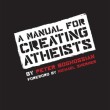
Since its release last November, Peter Boghossian’s A Manual for Creating Atheists has quickly become one of the most popular new books on atheism (as of now it has 200 reviews on amazon.com). As someone who has also recently written a book on atheism, though from a far different perspective, I was eager to see Boghossian’s method for “creating an atheist.” In this book review I’ll cover the good, the bad, and the ugly in A Manual for Creating Atheists. The Good Surprisingly,... Read More
Picasso’s Sublime Tragedy
by Dominicans of the Province of St. Joseph
Filed under Art
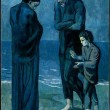
Pablo Picasso’s Tragedy (1903) depicts three figures huddled on a beach—presumably a family. We see nothing of the ‘tragedy’ itself, however; no trace of specific disaster remains, and we are left to speculate about what series of events may have led to their misfortune. The focus of the painting centers us on the figures themselves. The man and woman are turned inwards in an inherently familial pose, but the distance between them and their downcast eyes reveal their inability... Read More
Beating a Catholic Straw-Man: A Review of “The Swerve”
by Bishop Robert Barron
Filed under Book Reviews, History
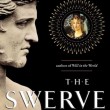
In 2005, Harvard scholar Stephen Greenblatt published a wonderful book on Shakespeare called Will in the World: How Shakespeare Became Shakespeare. Witty, insightful and surprising, it caused thousands of people, including your humble scribe, to look at the Bard with new eyes. Thus it was with great anticipation that I opened my copy of Greenblatt’s latest The Swerve: How the World Became Modern. Like its forebear, this new book is indeed lively, intelligent and fun to read, but as I... Read More
What ‘Gravity’ Teaches us about Technology and God
by Bishop Robert Barron
Filed under Movies/TV
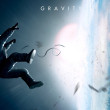
Spoiler alert: The article below includes key plot details for the film “Gravity." Alfonso Cuaron’s “Gravity” is the most visually arresting movie I've seen since “Avatar.” Its special effects have been quite rightly characterized as revolutionary and groundbreaking. But what is perhaps most surprising about this stunning film is its clear and profound religious import. The movie opens with a splendid vista of the earth viewed from outer space. As we are taking in this... Read More






